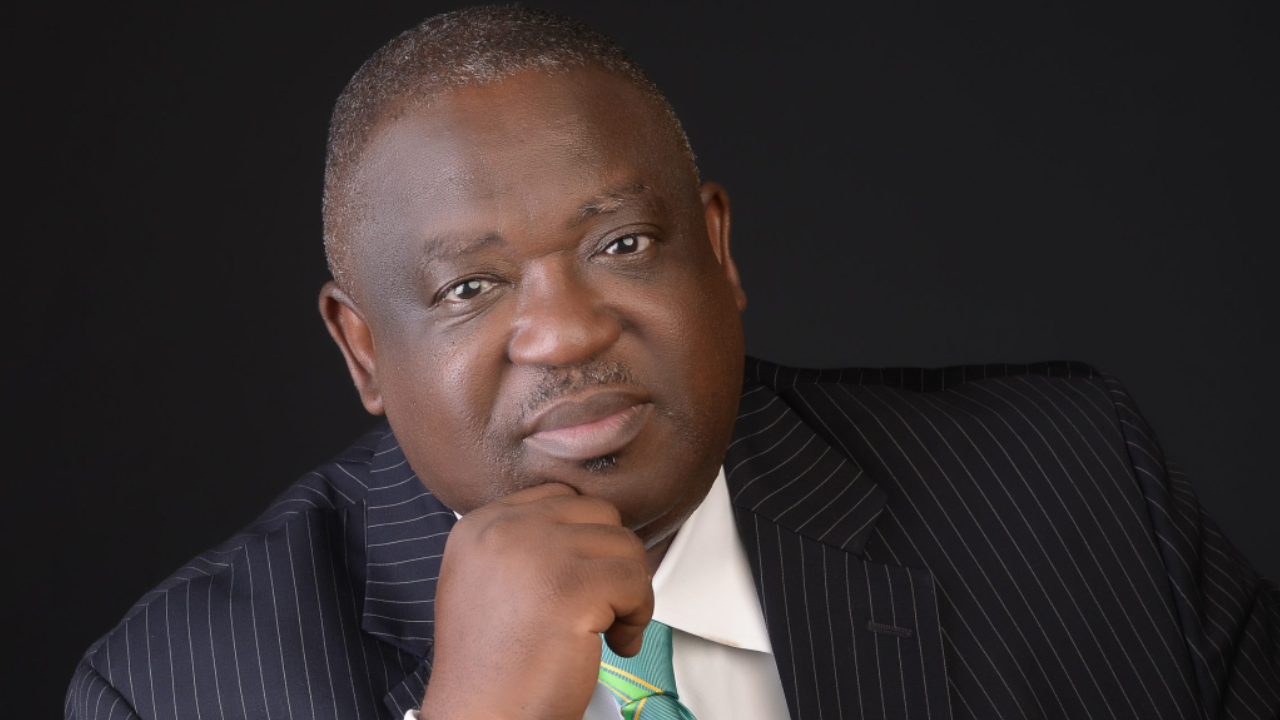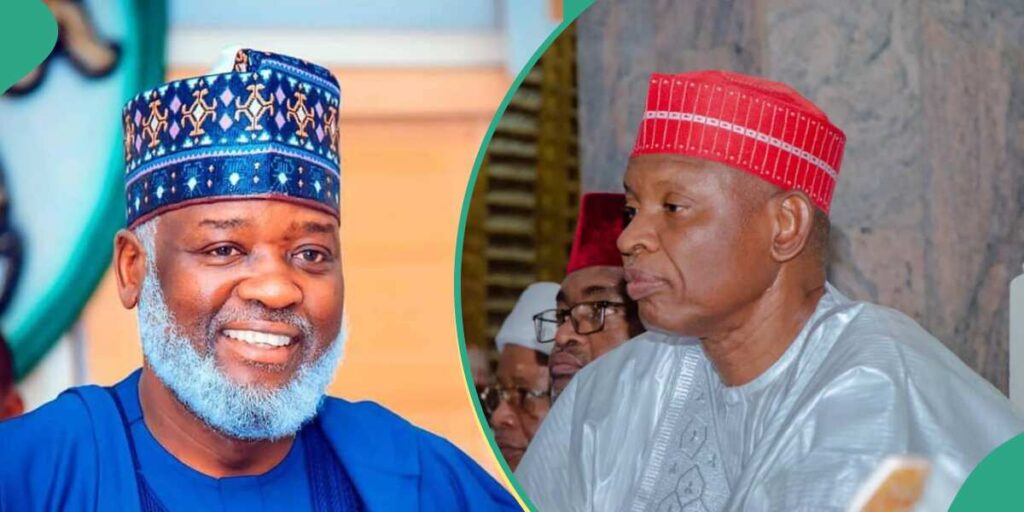Disquiet is gripping the camps of two Nigerian Governors awaiting the Supreme Court’s verdicts over the possibility of them retaining their hard-won offices.
The governors are Abba Yusuf of Kano State, and Caleb Mutfwang of Plateau State who appealed against their removal from office by Appeal Court.
The Supreme Court, on December 21, 2023, reserved judgement in the appeal filed by Governor Yusuf, challenging the verdict of the Court of Appeal and the State Election Petitions Tribunal that sacked him.
Also, the Supreme Court, on Tuesday, January 9, 2024, reserved judgement on a suit filed by Governor Mutfwang seeking to restore his mandate to govern the state.
John Okoro who led a five-member panel of justices reserved the judgment after he took arguments from lawyers to both parties in the case.
The apex court is expected to deliver a verdict on the matter before 16 January, when the appeal will expire.
Mutfwang of the Peoples Democratic Party (PDP) had scored 525,299 votes to beat the All Progressives Congress (APC) candidate, Mr Nentawe Yilwatda, who garnered 481,370 votes during the March 18, 2023 governorship poll in the state.
The governor’s election was upheld by the Plateau State Governorship Election Petitions Tribunal in Jos, the state capital.
However, the Court of Appeal in Abuja overturned the victory, necessitating Mutfwang’s appeal at the Supreme Court.
The governor, who made this request in his appeal filed before the apex court by an eight-man team of Senior Advocates of Nigeria(SANs), led by Chief Kanu Agabi, accused the lower court of not giving his and his party, the Peoples Democratic Party (PDP), fair hearing.
A three-man panel of the Court of Appeal led by Justice Elfrieda Williams-Dawodu had on November 19, 2023 nullified the election of Mutfwang and ordered the Independent National Electoral Commission (INEC) to issue a Certificate of Return to the candidate of the All Progressives Congress (APC), Nentawe Goshwe.
The appellate court held that the appeal brought by Goshwe was valid as the qualification issue was both a pre and post-election matter under Section 177(c) of the Nigerian Constitution and Sections 80 and 82 of the Electoral Act, 2022.
Dissatisfied with the judgment, the governor formulated eight grounds of appeal on why the Supreme Court should validate his election.
He argued that the issue of nomination and sponsorship, which underpinned Ground One of the petition by the APC, is not only a pre-election matter but within the internal affairs of the fourth
Respondent (PDP), and as such the first and second Respondents lacked the locus standi to canvass it.
The appellant also argued that the judgment of the lower court delivered on November 19, 2023 is fatally flawed for want of jurisdiction regarding Section 285(2) of the Constitution (supra).
He insisted that disobedience of court order is not one of the grounds for maintaining an election petition under Section 134 of the Electoral Act (supra), nor is it part of Section 177(c) of the Constitution (supra), let alone disqualifying the appellant from contesting the election.
The governor further maintained that given the overwhelming oral and documentary evidence, including but not limited to EXHIBITS U and 2RA3, the fourth Respondent complied with EXHIBIT G1 by conducting a state congress on September 25, 2021, in Plateau.
He also contended that the evidence of the 16th prosecution witness was thoroughly discredited and controverted, as such, the lower court was wrong to heavily rely on it against him.
“The first and second respondents woefully failed to discharge the requisite burden of proof on them and, as such, not entitled to the reliefs sought in their petition, more so that having impugned the election as invalid for non-compliance, it is absurd of them to lay claim to victory for the same election.
“The lower court was in grave error when it held that the Tribunal was wrong in striking out the offensive paragraphs of appellant’s reply and utilising evidence of PW16, PW24, PW27 and PW28 as a tribunal of first instance.
At the day’s proceedings of the hearing of the Kano Governorship Appeal, Justice Okoro urged counsels involved in the matter to meet and agree on which of the nine appeals and cross-appeals should be heard, with the outcome binding on the remaining eight.
A consensus was reached by all the parties to make the main appeal which shall be heard by the apex court, with cross appeals such as that questioning the membership of Abba Yusuf abiding with the outcome.
Counsel for the Independent National Electoral Commission (INEC), Abubakar Mahmoud, began by stating that the key witness whose testimony was the ground for deducting the 165,616 votes of Yusuf deemed unlawful were subpoenaed to give evidence.
He said that his testimony was inadmissible for not being front-loaded along with the main petition at the Tribunal and as such his testimony and exhibits tendered are therefore incompetent.
INEC’s counsel informed the court that the said contested 165,616 ballot papers were authentic and originated from INEC and not elsewhere. He said it is not the duty of a voter, on the day of the election, to check if a ballot paper is signed or stamped and without the date of the election, adding that’s the task of a party agent.
Mahmoud further informed the court that the recounting of votes was done privately at the tribunal chambers after the deduction of the contested 165,616 votes.
He added that even when they were brought to the Court of Appeal they weren’t demonstrated.
INEC’s counsel further told the apex court panel that only a portion of the unlawful ballots were examined at the tribunal.
Mahmoud clarified that he is not taking sides except concerning the correct interpretation of the law.
On Yusuf’s membership of the New Nigeria’s Peoples Party (NNPP), he stated that is an internal affair of the political party concerned and not for an external body, citing previous decisions of the apex court.
He added that it is not a constitutional matter as being claimed by the All Progressives Congress (APC) which relied on Section 177(c) of the Constitution, as amended, and Section 77 of the Electoral Act.
Mahmoud faulted the practice of political parties that seek to use the Court as an “arena” to get victory after the voters had decided.
He informed the apex court that the New Nigeria Peoples Party (NNPP) submitted the name of Abba Yusuf as its candidate for the governorship election and that if the APC had anything against Yusuf’s candidacy, it should have done so after INEC published the names of candidates.
Counsel to Governor Yusuf, Wole Olanipekun, faulted the nullification of his electoral victory on grounds of the INEC presiding officer failing to sign or stamp the ballot papers.
Wole Olanipekun argued that that has nothing to do with the Electoral Act, insisting it is on INEC’s guidelines and as such not sufficient grounds to deem the votes unlawful, warranting nullification.
Olanipekun further told the court that based on the evidence given by an expert witness during the Tribunal stage of the matter, only about 1,800 ballots were not signed or stamped and that those are insignificant figures and as such insufficient to void the election.
On the membership of Yusuf, Olanipekun stressed that it is the internal affair of the party concerned, with the courts therefore lacking jurisdiction to decide on the choice of a political party’s candidate.
He therefore prayed the court to upturn the decision of the Appeal Court which affirmed the decision of the tribunal sacking the governor.

Caleb Mutfwang, Plateau State Governor
Counsel for APC, Akin Olujimi, insisted that Section 177(c) of the Constitution is a key determiner of the Kano matter and that the matter being a constitutional issue gives it jurisdiction to decide on it.
On November 13, the Court of Appeal upheld the verdict of the tribunal. In its ruling, the Appeal Court agreed with the judgement of the tribunal, ruling that the fielding of Abba Yusuf was in breach of the Electoral Law as he was not qualified to contest that election.
In September, the tribunal nullified the victory of Yusuf, the candidate of the NNPP in the March 18 governorship election.
The tribunal also affirmed Nasiru Gawuna of the APC as the duly elected governor of Kano.
The Supreme Court has fixed Friday, January 12, 2024 for ruling on the Kano governorship matter.

